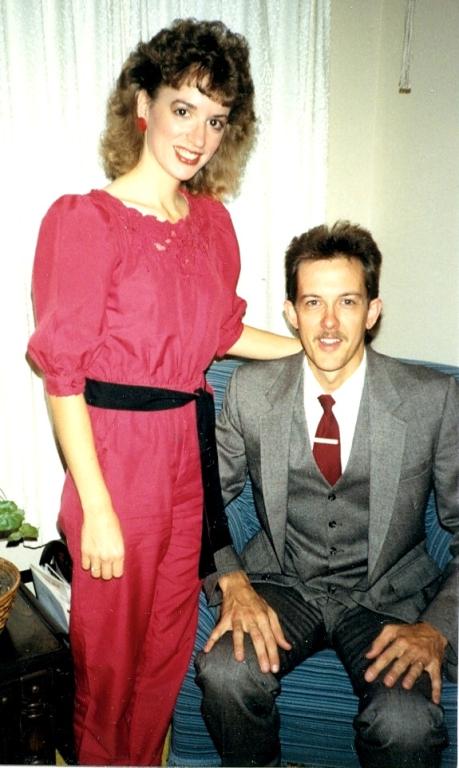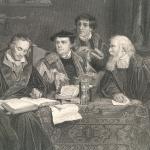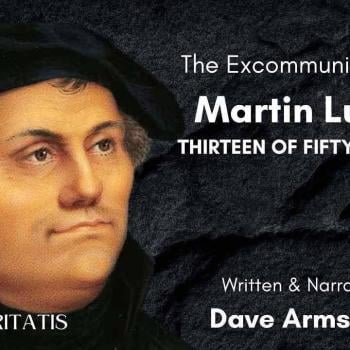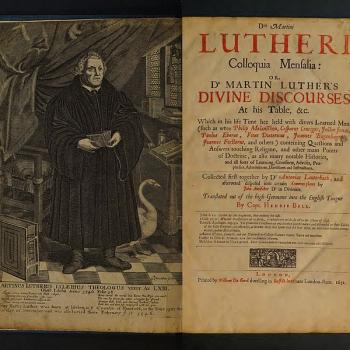Part Four: Apologetics, Abundant Evangelical Blessings, and Protestant Evangelistic Campus Ministry (1983-1989)

This is the ten-part story of my complete religious history, from nominal Methodism (1958-1967), to the occult and practical atheism (1968-1976), through evangelical Protestantism, counter-cult, pro-life, evangelistic, and apologetics work (1977-1990), and finally on to the fullness of the Catholic faith in 1991. It is found complete (75 pages) in my 2013 book, Catholic Converts and Conversion.
See All Ten Parts:
Part One: Nominal Methodism, Occult, and the Seeds of a Serious Christian Commitment (1958 – early 1970s)
Part Two: Nature Mysticism, Romanticism, Bible Movies, and the “Great Depression” (1968-1977)
Part Three: Evangelical “Born-Again” (?) Experience, More Lukewarmness, and Personal Revival (1977-1982)
Part Four: Apologetics, Abundant Evangelical Blessings, and Protestant Evangelistic Campus Ministry (1983-1989)
* * * * *
“Mrs. Right” and Influential Christian Assemblies
Despite all these wonderful positive changes in my life at Shalom, I decided to try a different church. The reason was an all-too-typical one. In 1982, I was intensely lonely (not having had a steady girlfriend for six years: since high school), and I wasn’t meeting anyone at Shalom who seemed to be a “prospect.” I was almost 24 and quite ready to become romantically serious with someone.
Although not the most serious reason to choose a congregation (if one at all), nevertheless, finding the right mate is a hugely important factor in a young man or woman’s life. I was trying to be sensible and meet a “nice Christian girl” and “Mrs. Right” in a church setting.
From 1982 to 1986 I attended an Assembly of God church and the young adult singles group there, where I met my wife Judy in November 1982 (we married in October 1984), made many friends (many of whom we still keep in contact with) and began a full-time campus apologetics / evangelism ministry.
I met one of my very best friends, and kindred spirit, Dan Grajek, there. He and I collaborated, starting in 1985, on evangelistic “cartoon tracts” and did a great deal of street evangelism. Dan later returned to the Catholic Church a few years after I did, and his wife Lori converted to Catholicism.
Also, during this period, I had some significant contact with Trinity Baptist Church, in Livonia, Michigan: a Reformed Baptist congregation that placed a great deal of emphasis on the typically Reformed, Schaefferian theme of “Jesus as Lord of all of life,” and “Christ and culture” issues: a “thinking man’s Christianity.” This was another big influence on my Christian life, tying in with my intellectual and apologetics emphasis.
My own theology – though I was influenced by many different strands of Protestantism – was as much Baptist as anything else (and I had gotten “baptized” in 1982 as a reflection of this belief; my real baptism having occurred as a baby in the Methodist church).
I was further blessed and “convicted” in the early 1980s by the fiery, charismatic-style preaching of Rev. George Bogle in Detroit. He is an immensely respected and influential pastor and valiant prayer warrior, who is still active today. This was the more experiential, heartfelt aspect of evangelicalism, that was important to me alongside my apologetics leanings. The two things aren’t mutually exclusive. They complement each other. As the Bible says: “Love God with all your heart, soul, strength, and mind.” We’re not to pick and choose among those four things.
I did a radio talk on Jehovah’s Witnesses on the largest Protestant radio station in Detroit: WMUZ (103.5 FM): a show associated with his ministry, on 3 November 1989. The same program remains on the air to this day.
I attended Shalom House again from 1986-1989. By this time, Al Kresta was the pastor. His emphasis was also strongly on “Christ and culture” and a thinking man’s Christianity.
Thankfulness and Gratefulness for My Evangelical Past
I can’t imagine (in terms of my own life and development) not having had these wonderful experiences or not having learned all these great things as an evangelical. It’s an important, crucial part of who I am, and always will be. This is why I frequently stress that becoming a Catholic is not at all an utter rejection of Protestantism.
The Catholic convert from Protestantism takes with himself or herself a huge amount of true teaching and practice and zeal for God, in the move from Protestantism to Catholicism. The Catholic Church joyfully acknowledges this (most notably in the Decree on Ecumenism from Vatican II).
It’s not so much a matter of going from “bad” to “good” but rather, from “very good” to “the best.” I thank God for my evangelical background, and that is why I have again “paid homage” to it in the course of this chapter. I feel a deep, sincere gratitude and thankfulness to God and the people involved, for having had all these manifest blessings and great teachers and friends in my Christian background.
Many of the things I hold very dear now (love of the Bible, interest in Christian worldview, pro-life, opposing cults and atheists, evangelism, fighting cultural sexual immorality, apologetics in general, strong family values, political conservatism, concern for the poor, love for great Christian authors and thinkers) were cultivated during those days. That’s where I initially learned all those things. It was the air I breathed.
I’ll always be thankful for that and remember those times with the utmost fondness. I loved my time as an evangelical, and most conversion stories that I’m aware of, from Catholics who came from the same sector of Protestantism, don’t run down the evangelical experience. The general sentiment is the same as mine: fondness and appreciation. They see it as kind of a stepping-stone.
I have great and fond memories. I learned all about the Bible when I was there, and good moral teaching. But I think there was more to Christianity, that the Catholic Church can offer, along the lines of sacramentalism and tradition and matters of Church and authority.
What I “Knew” as a Protestant: Myth vs. Fact
Converts to Catholicism often are accused of being ignorant of Protestantism, or of never having been “truly” Protestant at all. For those, like Calvinists, who believe that no one can ever truly fall away from salvation or justification, the latter opinion is often expressed: to leave Protestantism is proof positive (so they think) of never having been “saved” or regenerated or justified: in their definition. I was not only a committed Protestant (broadly Arminian or Wesleyan), but also an apologist as a Protestant.
Just for the record, here are some of the authors (apart from others mentioned in this account) that I read as a Protestant: Bernard Ramm, John Walvoord, R. C. Sproul, A. W. Tozer, Harold Lindsell, Merrill Tenney, James Montgomery Boice, Oswald Allis, George Marsden, J. Gresham Machen, Kierkegaard, John MacArthur, J. I. Packer, Billy Graham, Walter Martin, G. C. Berkouwer, F. F. Bruce, D. A. Carson, Norman Geisler, Alvin Plantinga, William Lane Craig, Gerhard Maier, Augustus Strong, Charles Hodge, Gleason Archer, John Gerstner, A. A. Hodge, Benjamin Warfield, Dunn, Alford, Westcott, J. B. Lightfoot, Peter Berger, Os Guinness, Thomas Oden, John Ankerberg, Dietrich Bonhoeffer, Jonathan Edwards, Ronald Nash, Carl F. H. Henry, Charles Colson, Dorothy Sayers, James Davison Hunter, Luther, Calvin, Wesley, Howard Snyder, Michael Green, Ron Sider, Ryken, Edersheim, Wenham, Arndt, Ladd, Albright (biblical archaeologist), D. Guthrie, Woodbridge, Jack Rodgers, Richard Foster, Reinhold Niebuhr, H. Richard Niebuhr, Goodspeed, Paul Maier, James Dobson, Chuck Swindoll, Yancey, Richard John Neuhaus (when Lutheran), Cornelius Van Til, J. P. Moreland, Gary Habermas, Carnell, J. N. D. Anderson, Lee Strobel, John Warwick Montgomery, among many others.
Of Church historians alone, I read, or at least had in my library: J. N. D. Kelly, Roland Bainton, Jaroslav Pelikan (when Lutheran), Philip Schaff, Kenneth Scott Latourette, Dillenberger, Martin Marty, Oberman, McGrath, A. G. Dickens, Hillerbrand, Harbison, Pauck, Spitz, Henry Chadwick, Steinmetz, Rupp, Althaus, Owen Chadwick, and Perry Miller.
I was also a regular reader of Christianity Today, Cornerstone, and Last Days Newsletter (Keith Green), and listened to many many Protestant radio shows.
Anti-Catholic Baptist apologist James White had made the ridiculous claim on his website (December 2004) that I had “given very little evidence . . . of having done a lot of serious reading in better non-Catholic literature.” I then produced the above list of my reading, and more. Likewise, anti-Catholic webmaster Steve Hays claimed in September 2006 that I “had a rather brief and superficial experience with Evangelicalism — reading popularizers.”
After “Dr.” White read my list, he didn’t miss a beat and shot back with his utterly predictable reply: “instead of blaming ignorance for his very shallow misrepresentations of non-Catholic theology and exegesis, we must now assert knowing deception.” Thus, in one second I went from being an ignoramus to being a “knowing” liar and deceiver. So it goes in trying to reason with anti-Catholics. I just wanted to set the record straight as to how much I did know as an evangelical.
My conversion to Catholicism wasn’t due to supposedly being ignorant of evangelical Protestantism (as my critics above want to foolishly believe). It wasn’t because I despised or hated same or came to regard it as worthless, or because I was disenchanted with it and looking to split. My journey began out of simple intellectual curiosity about why Catholics believed certain things that I thought were exceedingly strange and puzzling (particularly, the ban on contraception, and infallibility).
Respect for Catholicism, While Very “Pro-Protestant”
Many of my friends during my evangelical years were former Catholics. I knew little of Catholicism until the mid-80s. I regarded it as an exotic, stern, and unnecessarily ritualistic “denomination” that held little appeal for me. I wasn’t by nature attracted to liturgy, and didn’t believe in sacraments at all, although I always had great reverence for the “Lord’s Supper” and believed something real was imparted in it.
On the other hand, I was never overtly anti-Catholic. Having been active in apologetics and counter-cult work, I quickly realized that Catholicism was entirely different from the heretical sects, in that it had correct “central doctrines,” such as the Trinity and the bodily resurrection of Christ, as well as an admirable historical legitimacy; fully Christian, albeit vastly inferior to evangelicalism.
But I had always loved Church history too, and was somewhat of a medievalist. It’s difficult to be anti-Catholic when one so greatly admires the cathedrals, knightly chivalry, St. Francis, St. Thomas Aquinas, St. Thomas More, and so forth.
“True Truth Ministries” Apologetic Outreach (1985-1989)
The story within a story of this evangelical period (1977-1990) was my campus ministry, or evangelistic / apologetic outreach on college campuses (1985-1989): what I called “True Truth Ministries,” after Francis Schaeffer‘s phrase. I had a job when I got married, as a quality control lab technician: inspecting plastic moldings for cars (my only one that ever had anything to do with the Detroit automobile industry).
It was good enough as far as it went, with benefits and future prospects for advancement, and I had planned to stay there, but God had other plans for me. I describe how I felt God specifically called me to evangelistic ministry in February 1985, in a sort of “spiritual resume” that I presented to my church, dated 10 April 1989:
Some people think all talk of a “call” is mere metaphysical mush, to be discouraged and discounted, to say the least. I am anything but the type of person who “lives for experiences and highs” and goes from one “trip” to another. The only times God has directly communicated to me in a profound, undeniable way were with regard to my marriage (March-August 1984) and my ministry, in 1985. . . .
God spoke to me in an undeniable way, not audibly, but within my spirit. He simply told me that he wanted me to pursue occupationally what I had been doing as opportunity arose, for nearly five years. The content of what God said to me was extremely simple. It’s the intensity and definitiveness of the experience that is hard to express . . . J. I. Packer describes something of what I experienced:
Those whom God wants in . . . specialized ministry, are ordinarily made to realize they will never find job-satisfaction doing anything else. (Hot Tub Religion, Wheaton, Illinois: Tyndale, 1987, 109)
. . . On the other hand, being naturally of an analytical bent, I immediately sought to apply wisdom to the situation . . . I sought confirmation from my pastor and my friends, all of whom were enthusiastic, as far as I could tell. So, after three months of prayer and confirmation, I took the leap.
. . . nothing short of a direct message from God would have been sufficient motivation to continue despite anything and everything. I’ve never regretted my decision, and am every bit as excited and zealous today as I was four years ago.
Also, during this period I had a very distinct and terrifying vision of hell. I don’t remember specific details about it, other than that it was chilling to the bone. My wife Judy was with me at the time and she reports (with vivid memory) how I was very agitated and upset and turned white as a ghost, and how I told her what I saw and that God was calling me to help rescue people from going to hell. She agreed (as she always does), and believed that it made perfect sense for God to call me in this way.
The idea was simple: go to college campuses and share (evangelical) Christian truth, in ways that were accessible to those of that age and educational attainment. My models were the Ann Arbor Art Fair and Inter-Varsity. I started writing short tracts (about 58 of them over the next four years) and photo-copying a great amount of Christian literature, to provide answers for a broad range of questions. It was the pre-Internet version of my trying to provide comprehensive apologetic answers on a large scale (now I have more than 2400 posts on my blog). Over the next four years I evangelized and defended Christianity in countless ways, to all sorts of people. Here is a sampling of some of the things that happened, from my “monthly reports” that I sent to my supporters:
9 October 1985: Talked to Eric and many others (listening) at the Science Fiction Club [at the University of Michigan – Dearborn campus] about the resurrection, the Christian view of sex, inspiration of the Bible, and the free will vs. foreknowledge issue for three hours. The latter discussion was then continued with Eric, five others, and a philosophy professor for two more hours!
1 April 1986: I’ve passed out thousands of tracts and have witnessed to hundreds of people. This semester (at UM-Dearborn) I’m regularly conversing with twenty or so students and professors; some of whom I know fairly well and dialogue with at great length. . . . many of these unbelievers tell me that I’m the first Christian who has ever even attempted to offer answers to their sincere questions about Christianity.
12 June 1986: I first went out on the streets [of inner-city Detroit] on May 8th, and it was a very exciting and rewarding experience. The people are very open (a nice switch from school!). I was able to talk to a young man, Dennis, at great length, and he acknowledged Jesus as his Savior the following night at a street rally.
18 August 1986: [Ann Arbor Art Fair] I had a great talk with two very intelligent young men for ten hours (yes, 10!). One was a philosophy major and the other was Jewish. Many bases were covered.
3 March 1987: . . . in just two days of passing out 105 questionnaires, I had 41 people willing to talk . . . of those I’ve met with, nearly every one stated that they benefited from the talk, and almost all wanted to meet again.
14 June 1987: after the meeting [of the Wayne State Graduate Philosophy Club], I was able to talk more informally with eight people at once; seven of them were atheists. . . . A week later, I talked for an hour with one of the graduate students who is an atheist, and a very nice guy! He said he enjoyed our talk and wanted to have more discussions in the future. I’ve since given him several of my tracts, which he has readily accepted.
13 October 1987: The Ann Arbor Art Fair (my 7th annual) was another thrilling experience. I was there all four days, witnessing to, among others, a Tarot card reader, several Mormons, many socialists, eastern religionists (especially one Buddhist for 1 ½ hours), 2 ACLU lawyers at length, members of Bahai, Eckankar, and Scientology, women’s libbers, a Palestinian nationalist, animal rights advocates, and an agnostic, for 5-6 hours or so.
21 November 1987: On Nov. 5th I went down to Wayne State University to hear Prof. William Alston, a prominent philosopher who is a Christian. After he read his paper, I found myself with Alston and nearly the whole Dept. of Philosophy of WSU and its Philosophy Club, at a restaurant downtown (I was the only other Christian there). I managed to discuss God and religious experience as much as was possible.
20 May 1988: [I attended] three MENSA philosophy club meetings. MENSA is a group for people with very high IQ. . . . I spoke a lot, mostly about morality and relativism, the cosmological argument for God, and experience as a criterion for truth. The group was composed of six atheists and a pantheist, but I was received well (thanks for those prayers!) . . . to my surprise and glee, three people were willing to read anything I could give them.
19 November 1988: I went with a friend of ours to a pro-choice rally downtown. We were the only identifiable pro-lifers out of about 75 people. Consequently, despite the vociferous opposition of the crowd, I was interviewed by channel 7 [ABC] and appeared on the news that night. . . . I participated in the Rescue on Nov. 12th and was arrested for blocking access to an abortion mill. One baby was saved for sure; possibly two. It was the most deeply spiritual experience I’ve ever had. I was interviewed on Monday on the Christian radio show, Love Talks for about ten minutes.
***
Photo credit: very happily married to the beautiful Judy: our fifth anniversary portrait in October 1989. But this was also the very agonizing month that my Protestant evangelistic ministry collapsed.
***













